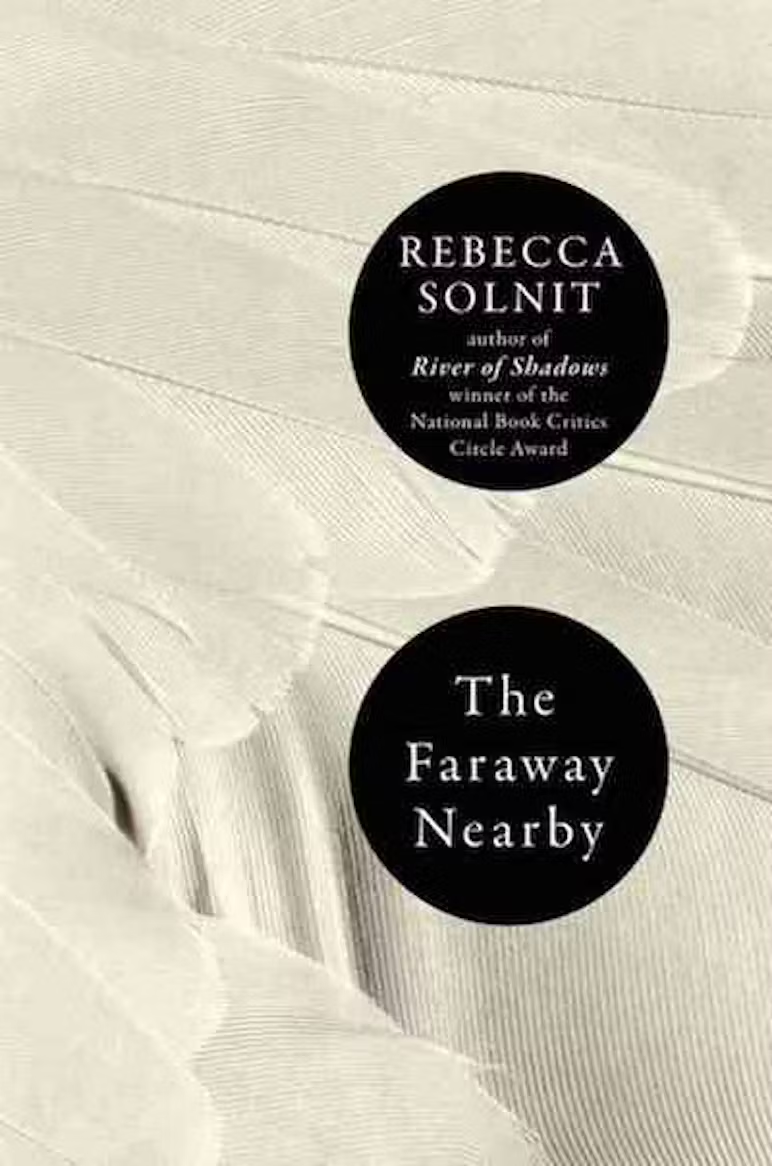Or: The One Where Metaphor Becomes the Main Character
Rebecca Solnit is the kind of writer who could write 300 pages about peeling an orange and make it feel like a revolutionary act. In The Faraway Nearby, she very nearly does. There are actual apricots. There are Icelandic fairytales. There’s Frankenstein, moths, myth, illness, motherhood, and the many moods of narrative itself—all braided into something that reads like a memoir wearing a really smart disguise.
To be clear, this is not a “here’s what happened to me” memoir. It’s a “here’s what happened to me, and here’s everything it made me think about for the next six months” memoir. Which is exactly why it works.
The Setup: Apricots, Alzheimer’s, and Archetypes
The book opens with Solnit’s mother being diagnosed with Alzheimer’s. Around the same time, Solnit receives a hundred pounds of apricots from a tree she didn’t ask to be responsible for. It sounds like the beginning of a Wes Anderson subplot, but this is where Solnit excels: in turning the mundane (rotting fruit, decaying memory) into metaphors that spiral into something cosmic.
Each chapter is a kind of essay unto itself, but together they form a constellation. Memory, storytelling, travel, illness, care, identity—these ideas keep looping and morphing. The book doesn’t follow a neat arc because life doesn’t, and Solnit has no interest in pretending otherwise.
The Vibe: Wander-y But Wise
Reading The Faraway Nearby feels a bit like walking through an enormous secondhand bookstore while someone very clever whispers behind you, “Did you know Mary Shelley basically invented the horror genre while recovering from heartbreak and global climate weirdness?” It’s tangential, yes. But purposefully so.
Solnit weaves personal anecdotes with literary analysis, cultural history, and meditative reflection in a way that’s both intimate and cerebral. She’s not afraid to digress. In fact, she’s deeply committed to the digression as a form of narrative resistance—against closure, against oversimplification, against the Pinterest-ification of personal growth.
Also: there’s a literal story running across the bottom margin of each page like a secret river. It’s part meta-commentary, part fairytale, part breadcrumb trail. It shouldn’t work. But it does. It’s the literary equivalent of watching someone pull off an outfit that includes both sequins and Crocs.
The Big Idea(s): Stories Save Us… Kind Of
At its core, The Faraway Nearby is about how we use stories to make sense of the mess. How we cling to narrative as both a lifeboat and a labyrinth. Solnit isn’t romantic about it. She knows storytelling can be manipulative, can limit as much as it reveals. But she also recognizes it as one of the few tools we have for navigating loss, chaos, and the ever-shifting terrain of selfhood.
She writes, “We think we tell stories, but stories often tell us.” Which feels especially relevant in a world where everyone is constantly being asked to “own their narrative” or “rewrite their story” like they’re pitching their trauma to Netflix.
Who This Book Is For (And Who It’s Not)
If you need your memoirs linear and your metaphors to behave, this is not your book. If the phrase “intellectual wandering” gives you hives, skip it. But if you like your nonfiction served with a side of poetic theory and mythic cross-referencing, The Faraway Nearby is your jam.
It’s especially satisfying for writers, artists, or overthinkers who find comfort in the gray zones. It’s for people who are allergic to “closure” but love a good metaphorical echo chamber.
TL;DR
The Faraway Nearby is part memoir, part myth, part philosophical mixtape. It meanders, spirals, loops, and occasionally disappears into itself—but always with intention. Rebecca Solnit doesn’t hand you answers. She hands you a map with parts missing and says, “Let’s see where this goes.”
And honestly? That feels like the truest story of all.







